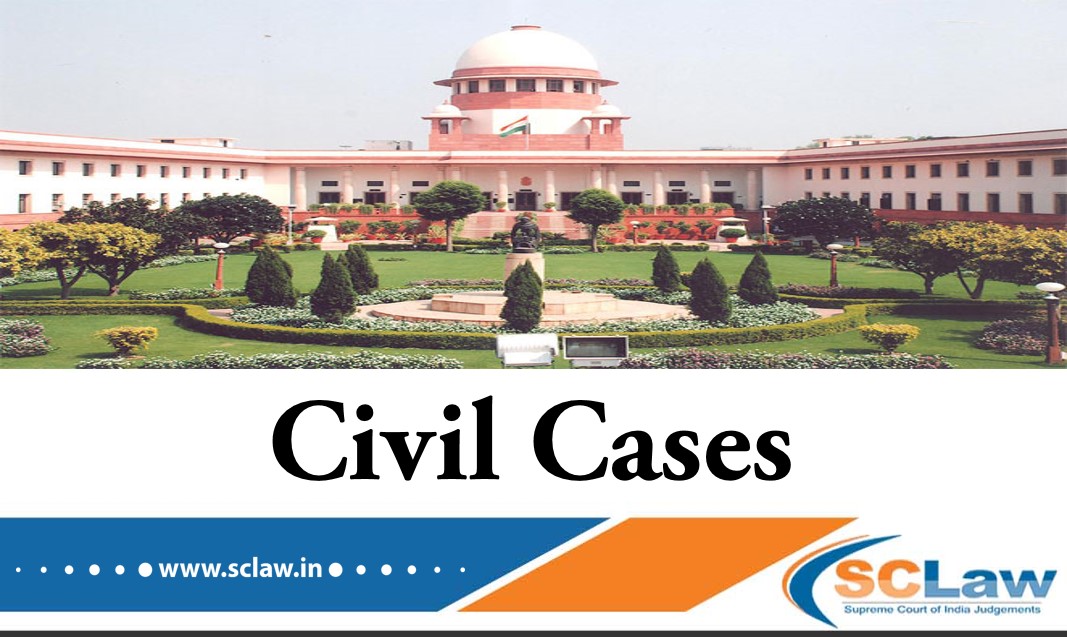Stamp duty—On Sale of property—Acceptance of order of Collector by one of the party would not ousts the jurisdiction of revisional authority to revise the stamp duty payable on the instrument of sale.
2007(2) LAW HERALD (SC) 1797 IN THE SUPREME COURT OF INDIA Before The Hon’ble Mr. Justice Dr. S.B. Sinha The Hon’ble Mr. Justice Markandey Katju Civil Appeal No. 8167…
Commission—Sitting Judge of High Court—Unless there is matter of “paramount national interest”, a sitting judge of High Court cannot be appointed as commission.
2007(2) LAW HERALD (SC) 1793 IN THE SUPREME COURT OF INDIA Before The Honb’le Mr. Justiec Arijit Pasayat The Honb’le Mr. Justiec D.K. Jain I.A. No. 6 IN Special…
Eviction–Personal necessity would include re-possession of the demised premises by the landlord for the purposes of its demolition so as to widen the entrance to another building belonging to the landlord.
2007(2) LAW HERALD (SC) 1789 IN THE SUPREME COURT OF INDIA Before The Honb’le Mr. Justiec B.P. Singh The Honb’le Mr. Justiec Harjit Singh Bedi Civil Appeal No. 6347…
Award—Limitation period of two years for making Award under Section 11-A has to be counted as the last of the dates out of the three modes of publication specified in Section 6 of the Act.
2007(2) LAW HERALD (SC) 1778 IN THE SUPREME COURT OF INDIA Before The Hon’ble Mr. Justice C. K. Thakker The Hon’ble Mr. Justice Lokeshwar Singh Panta Civil Appeal No.…
Written Statement—Accepted after expiry of time fixed—No reason to justify the acceptance—Matter remitted back.
2007(2) LAW HERALD (SC) 1776 IN THE SUPREME COURT OF INDIA Before The Hon’ble Mr. Justice Dr. Arijit Pasayat The Hon’ble Mr. Justice Lokeshwar Singh Panta Civil Appeal No.1572…
Purpose of seniority – Whether the seniority of the respondent in the cadre of Assistant Surgeons should be counted 19-7-1974 or he is entitled to count his service as Junior Assistant Surgeon for the purpose of seniority as Assistant Surgeon
(1998) 9 JT 316 : (1997) 11 SCC 561 : (1998) SCC(L&S) 242 SUPREME COURT OF INDIA STATE OF ORISSA AND ANOTHER — Appellant Vs. DR BHAKTABANDHU MISHRA — Respondent…
Arbitration Act, 1940 – Sections 13 and 23 – Extra item of work – Dispute about payment of extra items of work – Agreement for upper Ganga canal – Dispute relating to excavation of canal section for which rates not specified in schedule
(1997) 2 ARBLR 589 : (1997) 8 JT 522 : (1997) 6 SCALE 462 : (1997) 11 SCC 645 : (1997) 2 UJ 776 SUPREME COURT OF INDIA RAM…
Evidence Act, 1872 – Section 24 – Extra judicial confession – Retraction – Admission by accused admitting killing the deceased – Subsequent statement before the Court pleading innocence does not amount retraction of confession.
AIR 1998 SC 107 : (1998) CriLJ 89 : (1997) 8 JT 310 : (1997) 6 SCALE 315 : (1997) 8 SCC 158 : (1998) 1 UJ 101 SUPREME…
Constitution of India, 1950 — Article 14 —Compassionate appointment — Whether the Division Bench was justified in directing the Appellants to provide employment to the first Respondent herein under the scheme introduced by NALCO for assistance to displaced persons whose lands are acquired for the purpose of setting up NALCO’s establishment
(2014) 140 FLR 537 : (2014) 1 JT 182 : (2013) 15 SCALE 249 SUPREME COURT OF INDIA CHAIRMAN-CUM-MANAGING DIRECTOR AND OTHERS — Appellant Vs. BHARAT CHANDRA BEHERA AND…
Penal Code, 1860 (IPC) – Section – 302, 307, 149 – Transfer the case
(1997) 8 JT 379 : (1997) 6 SCALE 364 : (1997) 8 SCC 164 : (1997) 4 SCR 401 Supp SUPREME COURT OF INDIA SUKHBIR SINGH AND OTHERS —…















